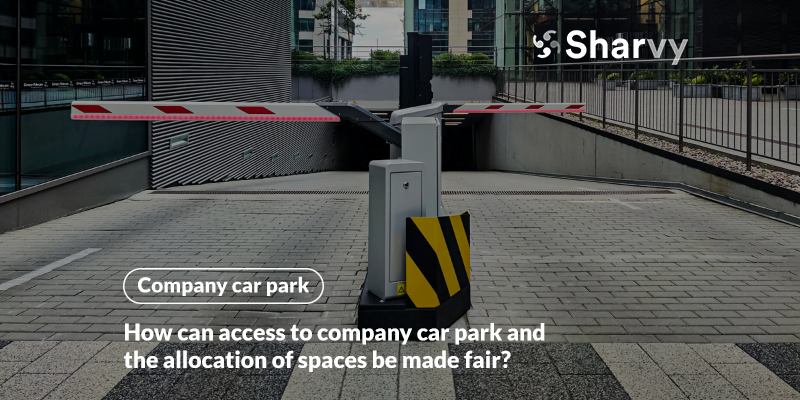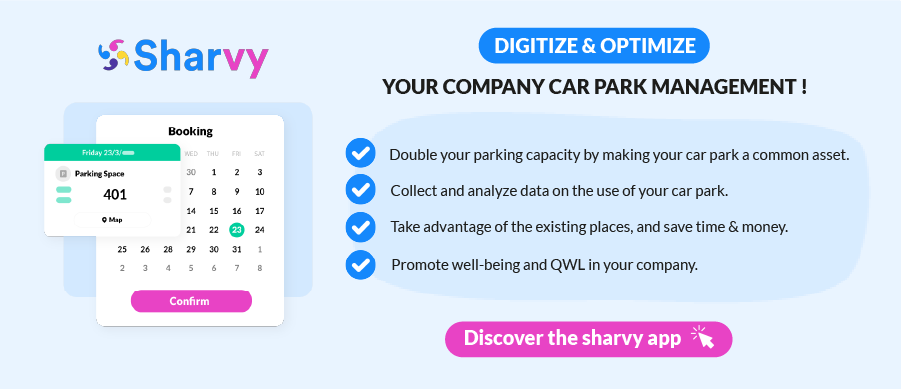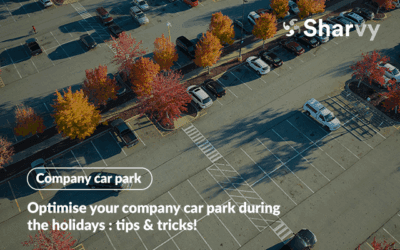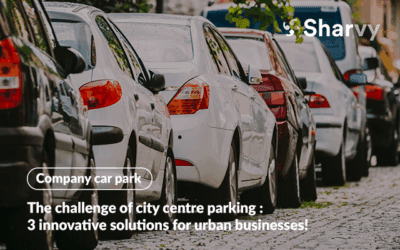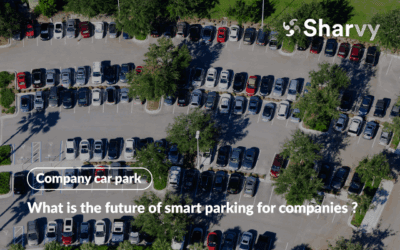Imagine every morning, your heart racing as you desperately search for a car park spot, while seeing spaces reserved for senior executives & members of management. This daily puzzle is more than just a minor irritation : it reflects an inequality that can undermine cohesion & engagement within your company.
Moreover, this daily scenario, far from trivial, can transform a simple morning routine into a major source of stress & frustration. So, in a world where every detail counts to maintain a harmonious work environment, the company car park management deserves special attention.
However, how can we ensure that access to the car park & the allocation of spaces are (truly) fair?
This question seems simple, but its answer requires thorough reflection on the practices & policies in place. Moreover, fairness in car park management is not just a matter of distributing spaces, but also of recognizing the varied needs of employees & establishing a culture of inclusion.
Curious to learn more? It’s here!
Why is equity in access to company car parks essential?
The answer to this issue ultimately comes down to the following question: “How would you feel if you had to spend long minutes every morning looking for a car park space before starting your workday?”
You would probably feel frustration & stress right at the start of your day. Moreover, you would need to anticipate this loss of time, which could significantly lengthen your commute and force you to leave home earlier.
At the same time, this constraint could also generate a feeling of injustice, especially if some of your colleagues benefit from reserved spaces daily.
Over time, you might get the impression that your company does not care about the needs of all its employees, which would undoubtedly affect your commitment & your job satisfaction in the long term.
With this example, the importance of equity in access to the car park becomes evident, doesn’t it?
However, what are the challenges related to access to company car parks?
1. The demand often exceeds the available parking supply.
Today, one of the main problems companies face is the limited capacity of their car parks. Now, it is not uncommon for the number of available parking spaces to be less than the actual demand of the employees.
This shortage can lead to situations where some employees are forced to look for parking spaces outside the company’s facilities, which can cause stress regarding the adherence to schedules & irritation, which is never a good way to start a workday. Moreover, parking fees in adjacent areas can lead to significant additional costs.
2. The gaps in the current management of company car parks create inequalities.
Among these gaps, we often see a lack of clear & objective criteria for the allocation of parking spaces, which fosters arbitrary & discretionary decisions. Moreover, this situation can lead to an unequal distribution of parking resources, where some employees benefit from privileged access at the expense of others, without it being based on “valid” professional & logistical justifications.
Furthermore, the lack of transparency in the parking policy can exacerbate tensions & perceptions of injustice within the company.
It is also common to see a lack of infrastructure adapted to the specific needs of certain employees, such as disabled people and pregnant women, for example. These shortcomings not only create disparities among employees but can also affect job satisfaction, commitment & productivity.
Therefore, effective & fair management of company car parks is essential to ensure a fair, inclusive & harmonious work environment.
3. Transportation habits influence the availability of parking spaces.
In parallel, the transportation habits of employees directly affect the availability of parking spaces. For example, if most of your employees use cars for their home-to-work commutes, this can quickly saturate your car park. Whereas increased use of public transportation, such as carpooling, could reduce the demand for parking.
Clearly, the adoption of these practices depends on various factors, such as work schedules, accessibility to public transport, and your company’s mobility policies. That is why it is essential to understand & anticipate the commuting habits of your employees to better manage access to your car park.
What solutions can make access to your company car park more equitable?
1. Opt for a digital solution that facilitates the reservation of parking spaces.
This is one of the preferred solutions if the capacity of your company car park is limited.
Sharvy, for example, is one of the pioneers of this type of software.
With the Sharvy solution, each employee can, via the app, make a reservation request for a parking space on specific dates. Sharvy uses an intelligent algorithm that integrates various factors such as the number of previous reservations by each employee, current availability, and priorities defined by your company to allocate spaces fairly.
In this sense, the solution mitigates disparities among employees, often due to variable arrival times. They are no longer subject to the first-come, first-served lottery, which invariably favors the earliest arrivals.
The app also manages cancellations & last-minute changes, allowing for the automatic reallocation of vacant spaces. In this sense, Sharvy ensures a fair & efficient distribution of resources, while reducing the tensions and frustrations associated with parking at the workplace.
Curious to learn more about the Sharvy solution? Contact us!
This approach thus helps to resolve issues of inequality among your employees, especially if your company has a limited number of parking spaces, as is the case with a car park of 80 spaces for 150 employees.
2. Create a prioritization system regarding access to your car park.
The advantage of such a system is to reserve parking spaces for employees who have specific needs and for whom the use of a car is inevitable.
For example, it makes sense to guarantee access to the car park for employees whose home is far from the workplace, poorly served by public transport, or who must manage family constraints, such as taking children to school daily.
Similarly, medical considerations may justify priority access to parking, such as for pregnant women & people with reduced mobility (PRM). By ensuring these employees a parking space, your company meets specific needs while promoting greater equality among employees.
This approach not only facilitates their daily life but also demonstrates your company’s commitment to creating an inclusive & caring work environment.
3. Consider a periodic rotation system.
By regularly alternating the employees allowed to park in the car park, for example on a weekly or monthly basis, the company avoids systematically favoring the same individuals, regardless of their arrival time & seniority.
Moreover, this system can be complemented by flexibility in work schedules, offering a better distribution of arrivals & departures, and avoiding peaks in the demand for parking spaces.
For example, some of your employees could be allowed to park on Mondays & Wednesdays, while others would have access to spaces on Tuesdays & Thursdays. In addition, some of the spaces could be allocated to employees whose work schedules vary or who work on time-limited projects, thus offering everyone an opportunity to use the facilities fairly.
However, although it aims to promote equity, this approach can create a significant administrative burden, requiring complex management of reservations & schedules. Your employees may feel frustrated due to the uncertainty related to the availability of spaces, which can affect their punctuality & flexibility.
4. Facilitate the adoption of alternative modes of transportation to the private car.
Did you know that implementing a mobility plan within your company can also promote more equitable access to your car park?
Indeed! By offering parking spaces reserved for carpoolers and financial incentives for using public transportation, you balance access to your limited parking resources.
For example, suppose your company has 100 parking spaces for 300 employees. If a mobility plan is implemented, including incentives for carpooling, using public transportation, and facilities for bicycles, your company could see a significant reduction in the demand for spaces.
Let’s say that, thanks to these initiatives, 30% of your employees opt for carpooling and public transportation, and 10% choose to bike to work.
Of the 300 employees, this accounts for about 90 people (30% of 300) reducing their need for parking by opting for carpooling and public transport. Adding the 30% who no longer use parking with the additional 10% using bike facilities, you achieve a significant reduction in the demand for spaces.
Instead of 300 employees potentially needing parking, about 180 employees continue to need it. This change would free up spaces and make parking access more equitable for the remaining employees while reducing the constraints related to congestion in your car park!
5. Allocate specific parking spaces for your visitors.
By assigning specific spaces to your visitors, you prevent spaces reserved for your employees from being used by outsiders, ensuring that your permanent employees retain a sufficient number of available spaces!
For example, by reserving 10 spaces exclusively for your visitors and managing them through a reservation system like Sharvy, you ensure that these spaces do not reduce the number of parking spaces for your employees, thus preserving their access.
6. Impose limits on parking space reservations.
In some cases, it may be wise to limit the number of credits (=reservations) an employee can make over a given period.
This way, you prevent your parking spaces from being disproportionately monopolized by a few employees.
For example, if an employee can reserve a parking space every day of the week, this could lead to a strain for other employees, especially if this person consistently arrives early in the day, thus depriving those who arrive later of an available space.
By establishing a reservation rule, such as the ability to reserve only three days per week, you ensure a fairer rotation of spaces, allowing more of your employees to have regular access.
Moreover, this approach can be particularly beneficial in contexts where some employees, due to their schedules or responsibilities, have more pressing parking needs. By regulating the number of reservations, you promote a more balanced distribution of spaces, reducing tensions and frustrations.
Best Practices from 2 Sharvy Clients!
- UpCoop: Priority access rules for pregnant women.
One of the best practices implemented by one of our clients (UpCoop) is to grant priority access to the car park for pregnant women.
This initiative stands out for its benevolent and equitable nature, addressing corporate social responsibility issues. Indeed, pregnant women are particularly prone to fatigue and mobility difficulties, especially in the last months of pregnancy. By reserving parking spaces close to the entrance for them, UpCoop shows considerate attention to their needs, thus easing their daily life and well-being.
This measure is not limited to mere comfort but also contributes to preventing health risks for them and their future child.
Moreover, this approach is part of a policy of inclusion and equal opportunities, as it adapts working conditions to the specific needs of certain employees without disadvantaging others!
- SPB: Using flex parking to promote equity.
SPB ensures equal treatment of its employees by sharing about fifty parking spaces among 120 holders.
Indeed, thanks to Sharvy, each employee has the same chances of accessing the car park, regardless of their seniority or hierarchical rank.
Furthermore, this system allows for better utilization of available parking spaces, optimizing the company’s resources while reducing tensions and inequalities that could arise from a fixed parking system.
Therefore, by opting for “flex parking,” SPB not only demonstrates its willingness to adapt to the changes in the world of work but also its commitment to creating a more inclusive and respectful work environment that meets everyone’s needs!
In conclusion
The quest for equitable access to your company car park goes beyond simple parking space management.
It’s an opportunity to rethink the employee experience within your company and to build a culture of equity and respect for individual needs.
By adopting innovative solutions such as prioritizing spaces for people with reduced mobility, flexible reservations for visitors, and the use of intelligent algorithms like Sharvy’s, you can transform a space often source of conflicts into a strategic asset for engagement and well-being at work!
This approach reflects not only good resource management but also a strong commitment to an inclusive and supportive work environment.
Have a question ? Check out the FAQ !
How does Sharvy's fair algorithm work?
Sharvy’s fair algorithm is designed to optimize the management of parking spaces by ensuring that each employee has an equal opportunity to access the company’s car park.
In other words, it considers several factors, including the number of reservations previously made by each employee and their specific needs. It then allocates the spaces in a way that maximizes the use of the car park while ensuring a fair distribution of the available spaces.
For example, if an employee has regularly used the car park in the previous weeks, the algorithm may prioritize access for another employee who has had fewer chances to reserve a space, in order to balance access opportunities.
Moreover, the algorithm can adapt its rules based on specific constraints, such as the need to reserve spaces for electric vehicles & closer locations for people with mobility difficulties.
Therefore, Sharvy’s fair algorithm allows for a rational and just use of parking resources, while meeting the diverse needs of employees!
How to use technology to improve access to your company car park?
No doubt: technology can play a key role in improving access to your company car park. For example, apps like Sharvy can be used to allow your employees to reserve and share parking spaces in real time (known as flex parking).
In parallel, sensors can also be installed to monitor the occupancy of spaces and inform your employees of availability via electronic panels and mobile notifications.
Finally, smart parking management solutions can optimize the use of space based on demand, thus reducing waiting times and potential conflicts. Adding a license plate recognition camera can also be a wise choice.
Want to learn more? Check out our latest articles!
Optimise your company car park during the holidays : tips & tricks!
How can you reinvent your company car park management during the holidays? What solutions and tips can you come up with? Focus!
The challenge of city centre parking : 3 innovative solutions for urban businesses!
Urban businesses : what solutions can be found to meet the challenge of city centre parking? Our advice and tips in this article!
What is the future of smart parking for companies ?
What is smart parking for companies? What trends will shape the future? And why? All the answers in this article!
Subscribe to our newsletter!
Resources
Contact us
+44 117 463 6990

